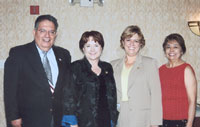• IDRA Newsletter • June- July 2003
The 2003 group of the San Antonio Community Education Leadership Program (CELP) recently became the 11th group to graduate from the program. More than 125 emerging and current leaders in the San Antonio community have participated in the CELP. Dr. Blandina Cárdenas, Dean of the College of Education and Human Development at the University of Texas at San Antonio, gave the keynote speech during the graduation presentation.
|
|
Founded in 1993, CELP is a nine-month training program designed to prepare and support a network of leaders who can work collaboratively and effectively across agency systems to promote and support the cultural, ethnical, and racial diversity in communities and institutions in San Antonio. The Intercultural Development Research Association (IDRA) designs the curriculum for CELP; Mr. Aurelio Montemayor, IDRA lead trainer, provides training and facilitation for each year’s CELP group.
Mr. Tony Rivera, the founding chair of CELP, said, “The CELP classes are unique because we deal with leaders to confront racism and diversity from A to Z, focusing on how to collaborate and build an infrastructure to benefit communities.”
CELP fellows develop skills of cross-cultural collaborative leadership. They move beyond perceived differences, learn how to identify common goals, and begin to form alliances with diverse community constituencies to resolve common problems. They use their community environments as the primary context for examining and discussing community issues. Through participation in a series of on-site training activities (seminars, site visits, skills development workshops, and individual and group projects), fellows gain highly practical knowledge about policies and program strategies for community improvement.
For more information about CELP contact Mr. Aurelio Montemayor at aurelio.montemayor@idra.org or Ms. Estella Rivera at estellacrivera@satx.rr.com.
Comments and questions may be directed to IDRA via e-mail at feedback@idra.org.
[©2003, IDRA. This article originally appeared in the June- July 2003 IDRA Newsletter by the Intercultural Development Research Association. Permission to reproduce this article is granted provided the article is reprinted in its entirety and proper credit is given to IDRA and the author.]



